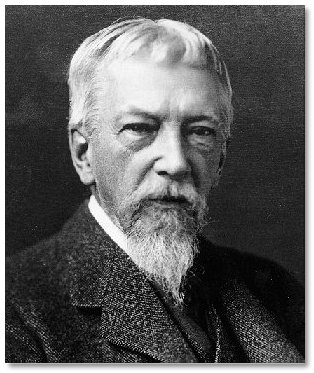Related Topics
Franklin Inn Club
Hidden in a back alley near the theaters, this little club is the center of the City's literary circle. It enjoys outstanding food in surroundings which suggest Samuel Johnson's club in London.
Philadelphia Medicine
The first hospital, the first medical school, the first medical society, and abundant Civil War casualties, all combined to establish the most important medical center in the country. It's still the second largest industry in the city.
Philadelphia Physicians
Philadelphia dominated the medical profession so long that it's hard to distinguish between local traditions and national ones. The distinctive feature is that in Philadelphia you must be a real doctor before you become a mere specialist.
A Toast To Silas Weir Mitchell, MD

|
| Silas Weir Mitchell |
Silas Weir Mitchell lived to be an old man during the Nineteenth Century when it was unusual to get very old. He was an important part of both the Philadelphia medical scene and the literary one. He became known as the Father of American Neurology as a published studies of nerve injuries caused by the Civil War. He published about 150 scientific papers, including famous investigations of the neurological effects of rattlesnake venom. His most famous medical treatment was the "rest cure" for hysteria, while his most enduring scientific discovery was the phenomenon of causalgia. He despised Freud, and psychonanalysis. No doubt the feeling was mutual, but the passage of time has tended to favor Mitchell more than Freud. The central role of sex is the essence of Freud's viewpoint, while Mitchell is summarized in the remark that, "those who do not know sick women, do not know women."Struggling medical students can take heart from the well-documented fact that Mitchell applied to the Pennsylvania Hospital for an internship, and was rejected. Upset by the experience, he toured Europe for a year and applied again. He was again rejected. He later applied for the faculty at Jefferson and was rejected, but his reaction to that was one of rage and vengeance. Just what these two episodes out of Philadelphia medical politics really mean, remains to be clarified by Mitchell's biographers.

|
| Franklin Inn |
Mitchell's second career was literary, publishing 12 novels and 5 books of poetry. He is honored as the founder of the Franklin Inn Club, for century home to every important literary figure in Philadelphia. It is striking that he selected Benjamin Franklin as the guiding star of the Inn since Franklin similarly was eminent in both science and culture, and an ornament to conversation and society. In a pacifist Quaker City, both men approved of combat, and his novel about Hugh Wynne stresses that his hero was a "Free Quaker, meaning one who fought in the Revolution. Because of his strong Republican views, he was never made a professor at the local medical school.

|
| College of Physicians |
Mitchell's patient Andrew Carnegie donated the funds to build a new building for the College of Physicians when Mitchell was its President. When Mitchell was president of the Franklin Inn, Carnegie wrote him, asking for suggestions about donating a small sum, say five or ten million, and asking where it should go. That was the Inn's big chance, all right, but somehow it failed the test. Mitchell suggested that the money be given to raise the salaries of college professors, thus perhaps suggesting that this veteran of many academic revolts did eventually soften his views.
Originally published: Friday, June 23, 2006; most-recently modified: Wednesday, May 22, 2019